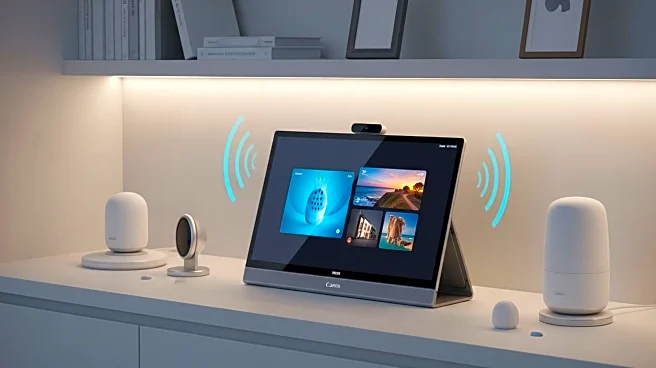What's Happening?
Fiteye has introduced a 32-inch portable touchscreen TV that is currently on sale for $847 during Amazon's October Prime Day event, marking a 15% discount from its usual price of $997. This device, which operates on Android OS, is designed to serve multiple functions beyond a traditional television. It can be used as a monitor, a smart home dashboard, a signboard, and even a baby monitor. The TV is equipped with a 15,000-mAh battery, allowing it to be moved around the house easily. Despite its versatility, it is not intended to replace dedicated devices like tablets or traditional TVs but rather to complement them as an additional screen.
Why It's Important?
The introduction of such a multifunctional device highlights the growing trend of integrating smart technology into everyday home appliances. This portable TV's ability to serve various roles in a smart home setup could appeal to consumers looking for flexible and space-saving solutions. The device's discounted price during a major sales event like Amazon's Prime Day could further drive consumer interest and adoption. This trend reflects a broader shift towards smart home ecosystems where devices are expected to perform multiple functions, enhancing convenience and efficiency for users.
What's Next?
As smart home technology continues to evolve, devices like Fiteye's portable touchscreen TV may become more common, potentially influencing the design and functionality of future home electronics. Consumers might expect more from their devices, pushing manufacturers to innovate and offer products that can seamlessly integrate into smart home systems. The success of such products could also encourage other companies to explore similar multifunctional devices, potentially leading to increased competition and innovation in the smart home market.
Beyond the Headlines
The multifunctionality of devices like Fiteye's portable TV raises questions about the balance between versatility and specialization. While such devices offer convenience, they may not match the performance of specialized equipment in specific tasks. This could lead to a reevaluation of consumer priorities, weighing the benefits of multifunctionality against the potential drawbacks of compromised performance. Additionally, as smart home devices become more integrated into daily life, concerns about data privacy and security may also become more prominent, prompting discussions about the ethical implications of smart technology.









